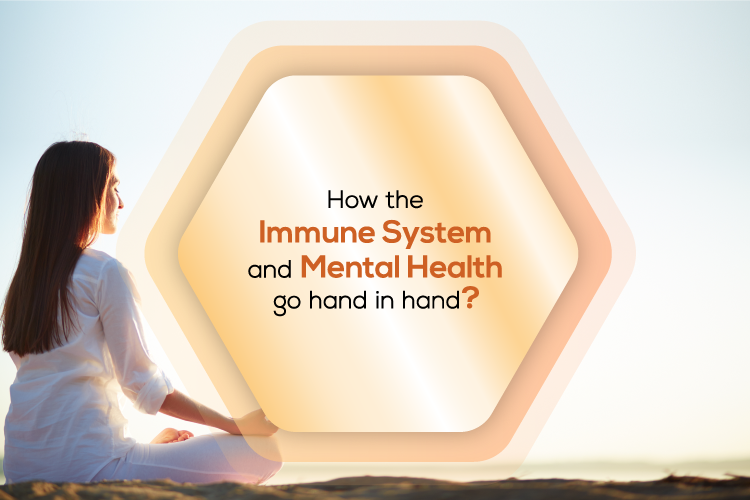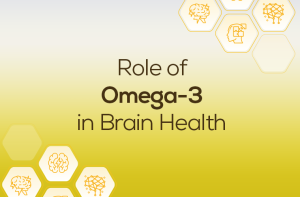According to WHO, our emotional, psychological, and social wellbeing along with our ability to handle stress constitutes our mental health. The mental health of a person is determined by various social, psychological, and biological factors at a given point in time.
The immune system can be defined as a system that attacks any outsider that enters the body – bacteria, viruses, parasites, and so on. Having a healthy immune system is essential for our wellbeing.[1]
It is vital to understand that mental health isn’t merely an absence of mental disorders and disabilities[2]. Mental health is essential for you to be productive and contribute to the society as a whole. Coping with stress and realising your abilities comes naturally with mental health.
It forms the basis of your thought process and the way you interact with people[3]. Mental fitness allows you to manage stress, enjoy your life, and prevents the relapse of any physical or mental illness.[4]
What happens when your mental health is not at its best?
From creativity to learning to maintaining interpersonal relationships, psychological health plays a key role. Poor mental health affects the smooth functioning of day to day activities. It may lead to a number of mental disorders, most commonly, an anxiety disorder. You may experience restlessness, fatigue, and disturbed sleep. You may also experience panic disorders, which can be described as panic attacks due to sudden overwhelming terror.
Mood disorders, which can be described as mood swings and schizophrenia disorders, which affect a person’s speech, thoughts and overall everyday interactions and activities.[5]
Some other effects of poor mental health include:
- Becoming extremely quiet and isolated. Thus avoiding social gatherings as much as possible
- Losing weight and appetite or in general drastic appetite changes
- Problems in concentration, speech and logical thinking
- Over sensitivity to everything around you – sounds, sights, smell and touch
- Poor performance at school, workplace or any activities[6]
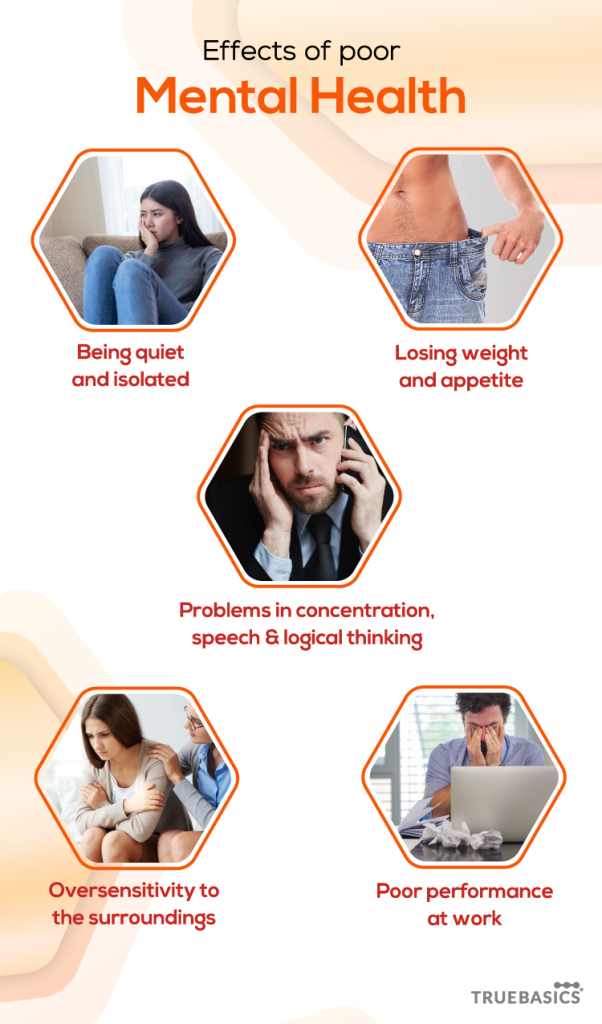
The mental health and immunity relationship
Mental health and the immune system are closely interlinked, the former affecting the latter and vice-versa. A study in the November 2002 issue of Health Psychology states that the immune system is impaired when a person is constantly under stress, known as chronic stress. The ability of the immune system to fight invasion and infection reduces in case of an unhealthy mental state[7]. One of the simplest reasons for the same could be resorting to harmful methods to overcome stress and other restlessness, like smoking and drinking, that has a direct impact on your body.
How does stress play a role?
A study by The University of Eastern Finland discovered that mental health has an impact on the immune system. It makes sense as many times mental and physiological stress appears in physical ways. The study was conducted on children with a history of physiological stress due to adverse childhood experiences and sleep disturbances. The researchers found that physiological stress interferes with immune system regulation as it lowers levels of adiponectin, an anti-inflammatory substance, and a key regulator of our natural immune system.[8]
As per a research conducted by the faculty of Pharmacy And Medical Technology, Jordan University for Women, the body generates cortisol when under stress and reduces lymphocyte circulation. Lymphocytes are necessary to fight foreign bodies.[9]
How to keep your mental health in its prime ?
Exercise
A healthy physical lifestyle helps to improve your psychological well-being. Exercise is highly recommended to battle emotional instability as it leaves a positive impact. It pumps up blood circulation to your brain which helps in thinking clearly. Additionally, it releases chemicals like endorphin and serotonin to improve your mood[10]. When you exercise, the body’s central and sympathetic nervous system communicates with each other, thus enabling a better response to stress.[11]
Yoga
Yoga seems to modulate stress response systems and increases heart rate variability which increases the flexibility of the body to respond to stress. Regular yoga helps in reducing stress, anxiety and depression and should be incorporated in your daily routine.[12]
Meditation
Meditation is largely connected to handling negative emotions and stress, which improves mental health. A study by the University of Wisconsin identified that after eight weeks of meditation, the electrical activity in the left frontal lobe, associated with being active in optimistic people increased. Hence, if you are struggling with stress or psychological well-being, practice meditation.[13]
Eating Well
Your brain requires healthy food and nutrients for proper functioning just like all the other organs in your body. After consulting your dietician, plan a balanced diet rich in fruits, vegetables, whole grains, nuts, dairy products, fish and plenty of water. High caffeine, sugary drinks and alcohol must be avoided.
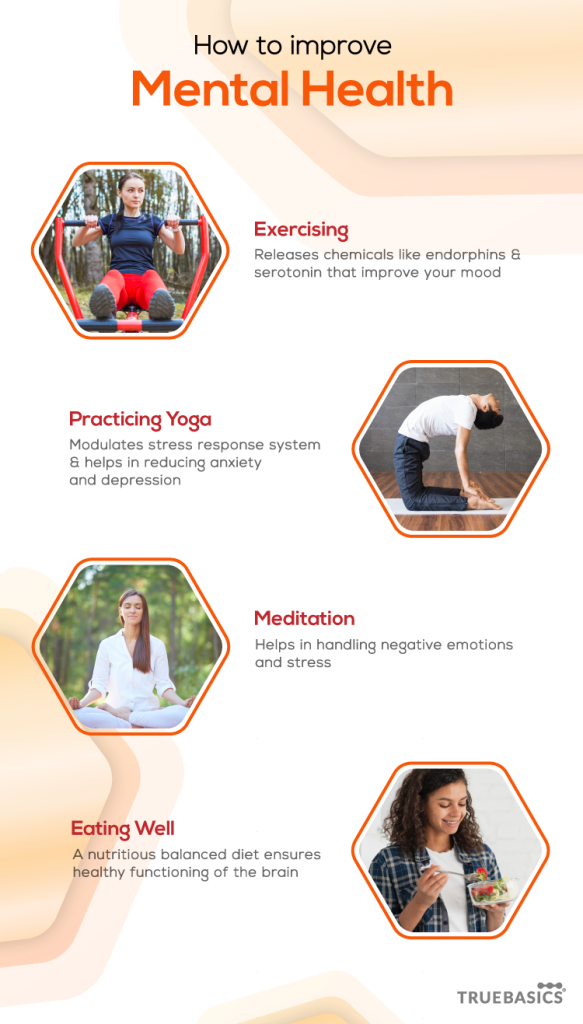
Talk to someone
Often the cause for stress or restlessness may be an issue, a problem or your feelings. Talking to someone about what you are going through reduces the load on your mind, and helps in feeling better. You feel supported and less alone.[14]
Walk in Nature
Spending time in natural settings by taking a walk in gardens and parks eases stress and anxiety[15]. You could also choose to go to a nearby nursery or if you have plants at home, spend some time sitting close to them.
Reducing alcohol and tobacco intake
Instead of resorting to smoking and drinking to run away from your stress, it is necessary to reduce the consumption of alcohol and tobacco as they do more harm than good and adversely affect your physical health.
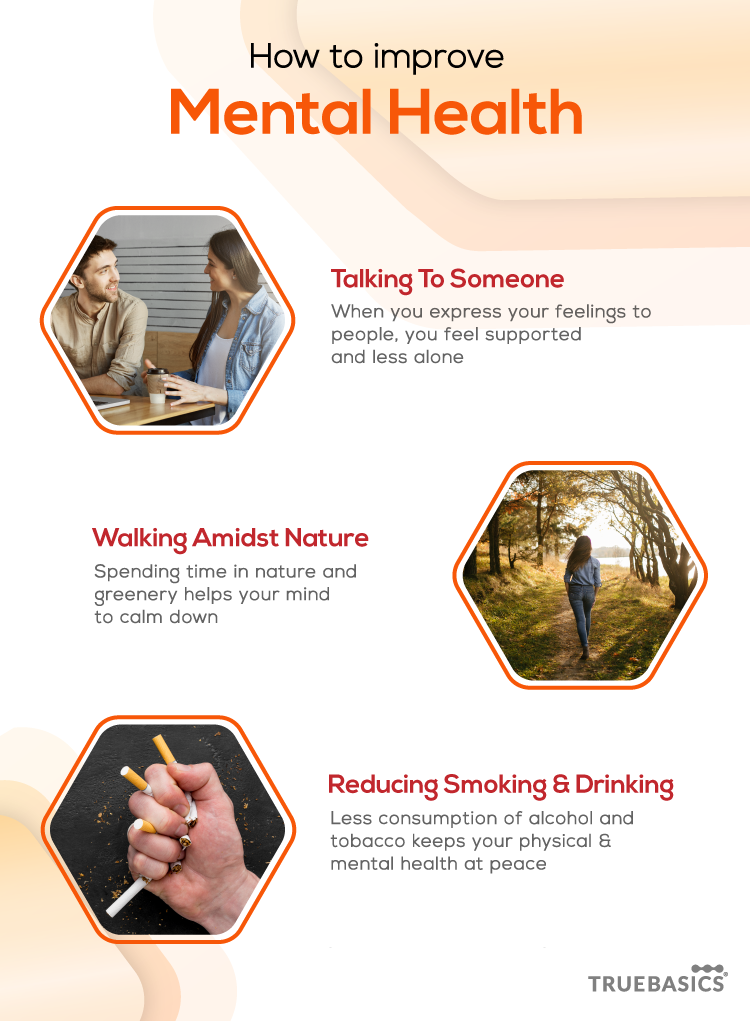
To Sum Up,
An integrated and balanced life is primarily driven by mental, emotional and physical well-being. Your productivity and efficiency at school, your workplace or even in casual social interactions depends on your psychological health. Your immune system and susceptibility to physical illness also are affected by your mental fitness. An adverse effect on your mental health directly weakens your immune system and hence it is vital to take care of your mental health.
While yoga, meditation, exercises, etc aid in healthy lifestyles, in case of severe stress, panic attacks or mental disorders, it is always advisable to take medical help immediately. Prioritise your mental health as it is one of the keys to a healthy body and life.
Sources :
[1] How the immune system works- Written by Tim Newman on January 11, 2018 – https://www.medicalnewstoday.com/articles/320101#immunity
[2] What is mental health?- https://www.medicalnewstoday.com/articles/154543#early-signs
[3] Mental Health Strengthening our response – https://www.who.int/news-room/fact-sheets/detail/mental-health-strengthening-our-response
[4] Benefits of Good mental health- https://toronto.cmha.ca/documents/benefits-of-good-mental-health/
[5] What is mental health – https://www.medicalnewstoday.com/articles/154543
[6] Warning signs of mental illness – https://www.psychiatry.org/patients-families/warning-signs-of-mental-illness
[7] Too Much Stress Hinders Immune System- Nov 2002- https://www.webmd.com/mental-health/news/20021104/too-much-stress-hinders-immune-system
[8] How mental health disorders can affect the immune system- https://www.sovteens.com/mental-health/mental-health-disorders-can-affect-immune-system/#:~:text=A%20recent%20study%20from%20Finland,can%20manifest%20in%20physical%20ways.
[9] Study on Cortisol – https://academic.oup.com/labmed/article/31/3/163/2657077
[10] Exercise and mental health- https://www.healthdirect.gov.au/exercise-and-mental-health
[11] 5 Mental Benefits of Exercise- https://www.waldenu.edu/online-bachelors-programs/bs-in-psychology/resource/five-mental-benefits-of-exercise
[12] Yoga for anxiety and depression- https://www.health.harvard.edu/mind-and-mood/yoga-for-anxiety-and-depression
[13] Meditation health benefits and stress reduction- https://www.webmd.com/balance/features/meditation-heals-body-and-mind#1
[14] How to look after your mental health- https://www.mentalhealth.org.uk/publications/how-to-mental-health
[15] Easy habits that can improve your mental health- https://www.webmd.com/depression/ss/slideshow-easy-habits-improve-mental-health

